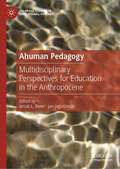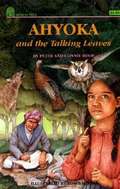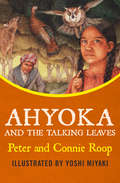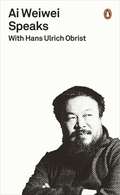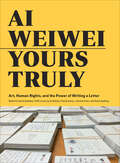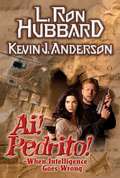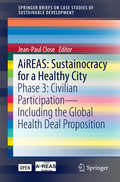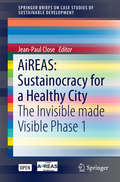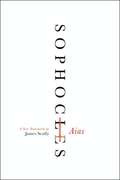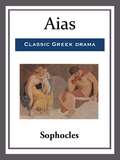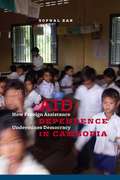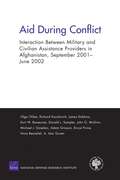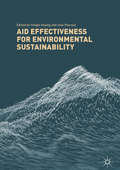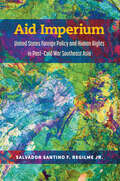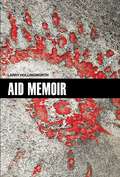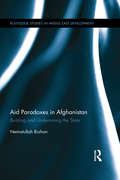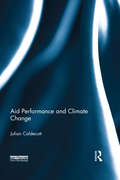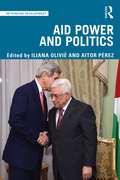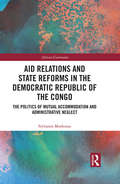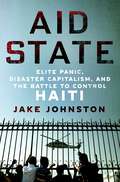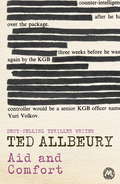- Table View
- List View
Ahriman: The Spirit Of Destruction (The Ahriman Legacy #Book 1)
by Puja GuhaWhen the CIA intercepts intelligence on a terrorist attack in Kuwait, Petra Shirazi, a former field agent, comes face to face with the Ahriman, one of Iran's deadliest assassins. It was the year when global economies continued to plummet despite analysts' predictions of a turnaround. It was the year when the Kuwaiti National Assembly consisted of the largest Islamic contingent in more than two decades. It was the month when the price of oil plunged to twenty dollars a barrel. It was the month when the Emir of Kuwait dissolved the National Assembly for the thirteenth time in fifteen years. It was the day when the head of the Islamic majority of the Assembly hired an assassin and the CIA intercepted intelligence about a new wave of terrorist attacks. It was the day that would change the face of the Middle East forever. It was May 15, 2021.
Ahuman Pedagogy: Multidisciplinary Perspectives for Education in the Anthropocene (Palgrave Studies in Educational Futures)
by Jan Jagodzinski Jessie L. BeierThis book brings together a collection of multi-disciplinary voices to discuss, debate, and devise a series of ahuman pedagogical proposals that aim to address the challenging ecological, political, social, economic, and aesthetic milieu within which education is situated today. Attending to contemporary calls to decenter all-too-human educational research and practice, while also coming to terms with the limits and inheritances through which such calls are made possible in the first place, this book aims to interrogate, but also invent, what we are calling an ahuman pedagogy. Organized in three main sections — Conjuring an Ahuman Pedagogy, Machinic Re/distributions, and Non-pedagogies for Unthought Futures — this multi-disciplinary experiment in ahuman pedagogies for the age of the Anthropocene offers an experimental – albeit always speculative and incomplete – series of pedagogical proposals that work to unthink and counter-actualize educational futures-as-usual.
Ahyoka and the Talking Leaves
by Peter Roop Connie RoopAhyoka helps her father Sequoyah in his quest to create a system of writing for his people. Copyright © Libri GmbH. All rights reserved.
Ahyoka and the Talking Leaves
by Peter Roop Connie Roop Yoshi MiyakeA Notable Social Studies Trade Book for Young People and recipient of the Florida Sunshine Award: In this absorbing chapter book, Ahyoka helps her father, Sequoyah, unlock the mystery of "talking leaves" to create the Cherokee alphabet Ahyoka is the daughter of Sequoyah, a silversmith who has given up most of his trade to focus on his true passion. He longs for the day when the Cherokee people can communicate to one another from afar and document the history of their lives. He wants his people--the Real People--to have a written language like the white men do. When he is ostracized from his community for the "magic" he is creating, he leaves his home to pursue his quest. His young daughter, who shares his dream, joins him on his journey. They work together to create a syllabic alphabet that will tell the story of the Cherokee people.
Ai Weiwei Speaks: with Hans Ulrich Obrist
by Hans Ulrich Obrist'If artists betray the social conscience and the basic principles of being human, where does art stand then?' Ai Weiwei - artist, architect, curator, publisher, poet and urbanist - extended the notion of art and is one of the world's most significant creative and cultural figures. In this series of interviews, conducted over several years with the curator Hans Ulrich Obrist, he discusses the many dimensions of his artistic life, ranging over subjects including ceramics, blogging, nature, philosophy and the myriad influences that have fed into his work. He also talks candidly about his father, his childhood spent in exile and his criticism of the Chinese state. Together, these extraordinary discussions give a unique insight into the outstanding complexity of Ai Weiwei's thought and work, and are an essential reminder of the need for personal, political and artistic freedom.
Ai Weiwei: Yours Truly
by Ai Weiwei Jasmine HeissA chronicle of the Chinese contemporary artist&’s interactive piece on prisoners of conscience, human rights, and the power of art and letter writing. Internationally renowned artist Ai Weiwei works at the intersection of art and politics. In 2014, he created @Large: Ai Weiwei on Alcatraz, an exhibition that engaged nearly 900,000 visitors in a conversation about human rights and freedom of expression. One of the artworks included was Yours Truly. This installation invited visitors to write postcards to prisoners of conscience around the world. On pre-addressed cards depicting the national birds and flowers of the countries where each prisoner was held, visitors wrote messages of hope, humor, and solidarity. In total, 92,829 postcards were written and sent. Ai Weiwei: Yours Truly delves into this astonishing project and invites you to engage with a work of art and a cause. Essays and a statement from the artists himself give a wider artistic and political context. In candid and heartfelt testimonials, five former prisoners and their loved ones—Ahmed Maher, Irom Sharmila Chanu, John Kiriakou, Chelsea Manning, and the family of Ebrahim Sharif Al Sayed—reflect on experiences of activism and detainment, and share the impact of receiving hundreds of postcards from people they would never meet. And photographs from the exhibition show the ordinary people who participated in the projects and some of the messages they wrote. This book is a visually stunning document, an inspiring call-to-arms, and a testament to the power of art to transform lives.
Ai! Pedrito! When Intelligence Goes Wrong
by Kevin J. Anderson L. Ron HubbardA rollicking and unpredictable adventure through the world of spies and double agents, lovers and enemies (often one and same). It has been said that somewhere in the world you have an exact double. This rocket-ride of a novel ignites with the sudden cry of "Ai! Pedrito!", as Naval Lieutenant Tom Smith discovers that his exact look-alike is the notorious South American revolutionary and spy, Pedrito Miraflores. Inspired by a real incident in the life of L. Ron Hubbard, "Ai! Pedrito!" is a fun-to-read, compelling novel of what can sometimes happen when intelligence goes wrong. "All the fast pacing of James Bond and the adventure of Indiana Jones." --Mystery Scene
AiREAS: Phase 3: Civilian Participation – Including the Global Health Deal Proposition (SpringerBriefs on Case Studies of Sustainable Development)
by Jean-Paul CloseThis volume describes phase 3 of the AiREAS multidisciplinary cocreation effort to produce a Healthy City. Phase 1 referred to making visible the invisible from an air quality and human exposure perspective. Phase 2 studies air quality related to health and Phase 3 looks at air quality, health and lifestyle from the perspective of persuasion to innovative change.
AiREAS: Sustainocracy for a Healthy City: The Invisible made Visible Phase 1 (SpringerBriefs on Case Studies of Sustainable Development)
by Jean-Paul CloseThis book describes the coming about and first results of the AiREAS "healthy city" cooperative in the city of Eindhoven and Province of North Brabant in the Netherlands. AiREAS is an initiative focused on the multidisciplinary co-creation of healthy cities using the core human value of human health and air quality as guiding principle for profound regional innovation. <P>The unique group process that followed uses the complexity of the city of Eindhoven as living lab. It is an anthropology based initiative that invites directly to the same table of core innovative responsibility the local government, innovative business partners, scientific insights and research, and civilian participation. <P>The first phase is described here in which the consortium decided to want to make the invisible of air pollution and human exposure visible for the integral innovative participation of all city's core pillars (policy, education, infrastructure, culture and entrepreneurship). The experience is unique in the world and proceeding now with more phases in Eindhoven and the role out of the same working format in other cities. This Brief is made available to inspire the world to address together the most complex issues of our current era: pollution, climate and core human values.
Aias
by SophoclesAmong the most celebrated plays of ancient Athens, Aias is one of seven surviving dramas by the great Greek playwright, Sophocles, now available from Harper Perennial in a vivid and dynamic new translation by award-winning poet James Scully. Still powerful and remarkably timely thousands of years after its creation, Aias is the moving story of a soldier returning home victorious from the Trojan War, only to discover he has lost his life’s purpose. This is Sophocles, vibrant and alive, for a new generation.
Aias
by SophoclesSophocles' play is a famous retelling of Aias's (Ajax's) demise. After the armor is awarded to Odysseus, Aias feels so insulted that he wants to kill Agamemnon and Menelaus. Athena intervenes and clouds his mind and vision, and he goes to a flock of sheep and slaughters them, imagining they are the Achaean leaders, including Odysseus and Agamemnon. When he comes to his senses, covered in blood, he realizes that what he has done has diminished his honor, and decides that he prefers to kill himself rather than live in shame.
Aichi 99 Kanbaku 'Val' Units
by Jim Laurier Osamu TagayaThe Aichi Type 99 Carrier Bomber (D3A) - code named 'Val' by Allied intelligence - was the mainstay of the Imperial Japanese Navy's carrier dive-bomber force from 1941 to 1943. It sank more Allied warship tonnage than any other Axis aircraft during World War II (1939-1945). While the Val's participation in the major carrier battles has been widely covered in other English language sources, details of its operations have received scant attention in English. This book explores the Val's combat operations. Colour illustrations and photographs complement the development of dive-bombing methods in the IJN.
Aid Dependence in Cambodia: How Foreign Assistance Undermines Democracy
by Sophal EarInternational intervention liberated Cambodia from pariah state status in the early 1990s and laid the foundations for more peaceful, representative rule. Yet the country's social indicators and the integrity of its political institutions declined rapidly within a few short years, while inequality grew dramatically. Conducting an unflinching investigation into these developments, Sophal Ear reveals the pernicious effects of aid dependence and its perversion of Cambodian democracy.International intervention and foreign aid resulted in higher maternal (and possibly infant and child) mortality rates and unprecedented corruption by the mid-2000s. Similarly, in example after example, Ear finds the more aid dependent a country, the more distorted its incentives to develop sustainably. Contrasting Cambodia's clothing sector with its rice and livestock sectors and internal handling of the avian flu epidemic, he showcases the international community's role in preventing Cambodia from controlling its national development. <P><P>A postconflict state unable to refuse aid, Cambodia is rife with trial-and-error donor experiments and their unintended consequences, such as bad governance and poor domestic and tax revenue performance—a major factor curbing sustainable, nationally owned growth. By outlining the terms through which countries can achieve better ownership of their development, Ear offers alternatives for governments still on the brink of collapse, despite ongoing dependence on foreign intervention and aid.
Aid During Conflict: Interaction Between Military and Civilian Assistance Providers in Afghanistan, September 2001-June 2002
by Olga Oliker James Dobbins Kurt W. Basseuner Donald L. Sampler Richard KauzlarichDescription and evaluation of relief, reconstruction, humanitarian, and humanitarian-type aid efforts in Afghanistan during the most intense phase of military operations, from September 2001 to June 2002. The efforts were generally successful, but there were serious coordination problems among the various civilian and military aid providers. Critical issues, both positive and negative, are identified, and a list of recommendations is provided for policymakers, implementers, and aid providers, based on lessons learned.
Aid Effectiveness for Environmental Sustainability
by Unai Pascual Yongfu HuangThis collection examines the role that foreign aid can play in dealing with the severe global challenge of climate change, one of the most pressing international development issues of the 21st century. Addressing the key threats of rising temperatures, changes in precipitation, coastal erosion and natural disasters, the book considers the implications for policy and future research, particularly in developing countries. Focusing on the worth of foreign aid in ensuring environmental sustainability, this collection consider how it can be used to improve access to sustainable energy, to promote efficient use of energy resources, to improve emission reduction and support the preservation of biodiversity in forests. Advancing our knowledge about foreign aid and climate change, it provides policy recommendations for the donors and recipient country governments. A cutting edge text on one of the most pressing international development issues of this century, this is key reading for all scholars of international development and climate change.
Aid Imperium: United States Foreign Policy and Human Rights in Post-Cold War Southeast Asia (Weiser Center for Emerging Democracies)
by Salvador RegilmeDoes foreign aid promote human rights? As the world’s largest aid donor, the United States has provided foreign assistance to more than 200 countries. Deploying global numerical data on US foreign aid and comparative historical analysis of America’s post–Cold War foreign policies in Southeast Asia, Aid Imperium provides the most comprehensive explanation that links US strategic assistance to physical integrity rights outcomes in recipient countries, particularly in ways that previous quantitative studies have systematically ignored. The book innovatively highlights the active political agency of Global South states and actors as they negotiate and chart their political trajectories with the United States as the core state of the international system. Drawing from theoretical insights in the humanities and the social sciences as well as a wide range of empirical documents, Aid Imperium is the first multidisciplinary study to explain how US foreign policy affects state repression and physical integrity rights outcomes in Southeast Asia and the rest of the Global South.
Aid Memoir (International Humanitarian Affairs Ser.)
by Larry HollingworthLarry Hollingworth, current visiting Professor of Humanitarian Studies at Fordham University in New York City, served as head of the UNHCR’s efforts in Bosnia throughout the lengthy conflict that plagued the former Yugoslavia in the early to mid ’90s. Aid Memoir follows Larry and his UN colleagues throughout multiple efforts to provide much-needed relief for besieged, isolated, and desperate communities riddled by senseless killing and aggression. The characters encountered throughout are at times thrilling, at times frightening. Larry spares no details, however troubling, and therefore shines a telling light on the reality of the situation that most will remember to have watched on their television screens.
Aid Paradoxes in Afghanistan: Building and Undermining the State (Routledge Studies in Middle East Development)
by Nematullah BizhanThe relationship between aid and state building is highly complex and the effects of aid on weak states depend on donors’ interests, aid modalities and the recipient’s pre-existing institutional and socio-political conditions. This book argues that, in the case of Afghanistan, the country inherited conditions that were not favourable for effective state building. Although some of the problems that emerged in the post-2001 state building process were predictable, the types of interventions that occurred—including an aid architecture which largely bypassed the state, the subordination of state building to the war on terror, and the short horizon policy choices of donors and the Afghan government—reduced the effectiveness of the aid and undermined effective state building. By examining how foreign aid affected state building in Afghanistan since the US militarily intervened in Afghanistan in late 2001 until the end of President Hamid Karzai’s first term in 2009, this book reveals the dynamic and complex relations between the Afghan government and foreign donors in their efforts to rebuild state institutions. The work explores three key areas: how donors supported government reforms to improve the taxation system, how government reorganized the state’s fiscal management system, and how aid dependency and aid distribution outside the government budget affected interactions between state and society. Given that external revenue in the form of tribute, subsidies and aid has shaped the characteristics of the state in Afghanistan since the mid-eighteenth century, this book situates state building in a historical context. This book will be invaluable for practitioners and anyone studying political economy, state building, international development and the politics of foreign aid.
Aid Performance and Climate Change
by Julian CaldecottThe richer countries spend about US$165 billion yearly on overseas aid, mainly to keep human development going. These efforts are undermined by climate change, water-catchment damage, biodiversity loss, and desertification, and their interactions with social systems at all scales, which few aid designs or evaluations fully address. This must change if aid performance is to be improved. Constraints to be overcome include limited understanding of the very complex systems that aid investments affect, and of the ecology behind climate change adaptation and mitigation. Aid Performance and Climate Change targets these problems and others, by explaining how to use multiple points of view to describe each aid investment as a complex system in its own unique context. With examples throughout, it reviews cases, ideas, and options for mitigation using technology and ecology, and for adaptation by preserving resilience and diversity, while exploring related priorities, treaties, and opportunities. Combining an empirical, eye-witness approach with methodological conclusions, this book is an essential resource for those looking to improve aid design and evaluation, and will be a necessary tool in training the next generation of aid professionals to respond to the causes and consequences of climate change.
Aid Power and Politics (Rethinking Development)
by Iliana Olivié Aitor PérezAid Power and Politics delves into the political roots of aid policy, demonstrating how and why governments across the world use aid for global influence, and exploring the role it plays in present-day global governance and international relations. In reconsidering aid as part of international relations, the book argues that the interplay between domestic and international development policy works in both directions, with individual countries having the capacity to shape global issues, whilst at the same time, global agreements and trends, in turn, shape the political behaviour of individual countries. Starting with the background of aid policy and international relations, the book goes on to explore the behaviour of both traditional and emerging donors (the US, the UK, the Nordic countries, Japan, Spain, Hungary, Brazil, and the European Union), and then finally looks at some big international agendas which have influenced donors, from the liberal consensus on democracy and good governance, to gender equality and global health. Aid Power and Politics will be an important read for international development students, researchers, practitioners and policy makers, and for anyone who has ever wondered why it is that countries spend so much money on the well-being of non-citizens outside their borders.
Aid Relations and State Reforms in the Democratic Republic of the Congo: The Politics of Mutual Accommodation and Administrative Neglect (African Governance)
by Stylianos MoshonasSince 2001 The Democratic Republic of Congo has been engaged in a three-fold transition process towards liberalisation, democratisation, and peace. Throughout this process, external actors (donors, international financial institutions, the UN system, aid agencies) have played a leading role, effectively setting the orientations and modalities of this transition, including their institutional dimension. Congolese actors have not been passively subjected to this process, however, but have potently shaped it in various ways. This book investigates the relationship between international aid partners and various Congolese actors since 2001. It examines this relationship as an aspect of the state reform process, with particular reference to the administration. Stylianos Moshonas argues that the pace and nature of reform has been compromised by the contradictions inherent within the process itself, as advocated by international partners, and by the ability of Congolese power holders to accommodate and co-opt such reforms in line with their own political strategies. Rather than framing aid relations as the outcome of the oppositional points of view of donors and Congolese actors, this book presents a systematic focus on the compromises and accommodative characteristics that aid politics have coalesced around, as well as the contradictory positions donors have found themselves in.
Aid Scaling Up: Do Wage Bill Ceilings Stand in the Way?
by Gerd Schwartz Annalisa Fedelino Marijn VerhoevenInformation on wage bill ceilings.
Aid State: Elite Panic, Disaster Capitalism, and the Battle to Control Haiti
by Jake JohnstonHaiti’s state is near-collapse: armed groups have overrun the country, many government officials have fled after the 2021 assassination of President Moise and not a single elected leader holds office, refugees desperately set out on boats to reach the US and Latin America, and the economy reels from the after-effects of disasters, both man-made and natural, that destroyed much of Haiti’s infrastructure and institutions. How did a nation founded on liberation—a people that successfully revolted against their colonizers and enslavers—come to such a precipice?In Aid State, Jake Johnston, a researcher and writer at the Center for Economic and Policy Research in Washington, DC, reveals how long-standing US and European capitalist goals ensnared and re-enslaved Haiti under the guise of helping it. To the global West, Haiti has always been a place where labor is cheap, politicians are compliant, and profits are to be made. Over the course of nearly 100 years, the US has sought to control Haiti and its people with occupying police, military, and euphemistically-called peacekeeping forces, as well as hand-picked leaders meant to quell uprisings and protect corporate interests. Earthquakes and hurricanes only further devastated a state already decimated by the aid industrial complex. Based on years of on-the-ground reporting in Haiti and interviews with politicians in the US and Haiti, independent aid contractors, UN officials, and Haitians who struggle for their lives, homes, and families, Aid State is a conscience-searing book of witness.
Aid Volatility and Dutch Disease: Is There a Role for Macroeconomic Policies?
by Alessandro Prati Thierry TresselThis paper studies how macroeconomic policies can help offset two unintended and undesirable features of foreign aid: its volatility and Dutch disease. We present evidence that aid volatility augments trade balance volatility and that foreign aid, with the important exception of years of adverse shocks, depresses exports. We also find that these effects can be mitigated through changes in net domestic assets of the central bank-a variable that reflects both monetary and fiscal policy. To characterize the optimal policy, we develop a general equilibrium model in which the capital account is closed and aid influences productivity growth through positive (public expenditure) and negative (Dutch disease) externalities. In this setting, macroeconomic policies permanently affect real variables and can improve welfare if donors do not distribute foreign aid optimally over time
Aid and Comfort
by Ted AllbeuryOne spring day in 1985 Arthur Casey marches into the Soviet embassy in Washington offering his services as an informant. He's the most valuable asset the KGB will ever have. Yuri Volkov is the KGB officer appointed as Jarvis's 'controller'. He comes to despise the weak and feckless American prepared to send men to their deaths for financial gain. Larry Getz is the senior CIA officer who must hunt down the traitor in their midst. So begins a cat-and-mouse game of danger and deception, bluff and double-bluff in which, if Getz is to succeed, he'll have to bend the rules and violate the sanctity of the US Constitution. But does the end justify the means? And Just how dirty is Getz prepared to play?

